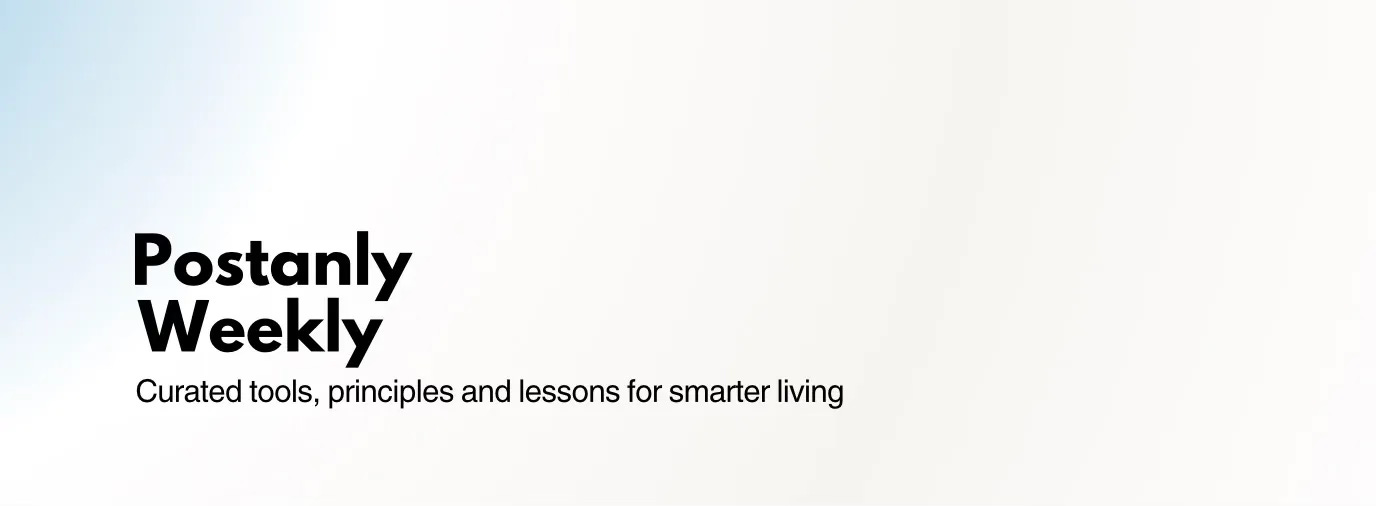The calm life method — 5 habits of super calm people
The one mental shift that makes life 10x easier (most people fear it)
Postanly Weekly is a reader-supported smarter living newsletter. To support my work, you can upgrade to a paid subscription for $9 per month or $60 for an entire year. Or choose from my “forever” sliding scale discount options ( 70% off, 60% off or 50% off). Pick what’s right for you. Your modest donation keeps Postanly Weekly going. Download my free books here.
Newsletters to enhance your learning!
This is a summary of thought leaders and publications. Productivity, finance, healthy-living, self-improvement, career growth and more.
Top publications readers are loving. The most valuable newsletters—trusted by thousands and proven to deliver insights that matter.
The must-reads to keep you ahead. Take control of your learning.
Modern life can be draining is an understatement.
Modern life is draining is an understatement. Most people feel overwhelmed, stressed and anxious by the close of the day. But even on the busiest or most stressful days, there are ways to get back to inner calm.
You deserve to feel relaxed, focused, and in control of your day.
“The more tranquil a man becomes, the greater is his success, his influence, his power for good. Calmness of mind is one of the beautiful jewels of wisdom,” says philosophical writer James Allen.
Imagine waking up each day feeling refreshed and energised, ready to take on whatever challenges come your way. Imagine feeling confident and empowered in your decisions, knowing that no matter what happens, you have the tools to handle it with grace and ease.
Whether you work in a busy office or from home, the calm method can help you tap into a sense of calm and balance that will carry you through any day.
The Calm Life Method is a concept that promotes achieving a state of calmness and tranquillity in your life. It’s about finding ways to slow down, take a step back, and appreciate the little things in life.
And the best part? It’s adaptable to any lifestyle.
If you are tired of the hustle and bustle of everyday life and feel like you’re constantly running on a hamster wheel, unable to catch your breath, try a few of these techniques.
Acknowledge the chaotic order of life
First, acknowledge that chaos is a part of life and feeling overwhelmed is okay. Make peace with the natural order of all life.
Accepting this fact can help you feel more in control of your life. It allows you to approach setbacks with a healthier perspective and a greater sense of control.
“Chaos is the score upon which reality is written,” says novelist Henry Miller.
Embrace the imperfections of life.
Nobody has all the answers or can handle everything perfectly.
It’s okay to feel overwhelmed or encounter setbacks. Embracing imperfections is a part of being human.
It’s a better approach to life that will allow you to adopt a more resilient mindset and develop techniques to navigate challenging times.
Take a deep mindful breath to regain composure
Secondly, when you feel like any experience, any experience, situation event, or task is overwhelming, remember to take a deep breath to regain composure.
Here’s how:
Take a slow, deep breath.
Hold your breath for a bit, then exhale, allowing your breath to leave your body completely.
Repeat this process a few times. Focus on how your breath enters and leaves your body.
As you practice the routine, let go of any tension or stress you may be holding onto, and allow yourself to relax.
“When in haste, rest in the present. Take a deep breath and come back to here and now,” says author Dan Millman.
It sounds simple, but it’s an effective way to activate your body’s relaxation response and reduce stress.
Deep breathing increases oxygen to your brain and stimulates the part of your nervous system that promotes relaxation.self
Let go of attachments to specific outcomes or expectations
“The greatest weapon against stress is our ability to choose one thought over another.” — William James
According to Stoic teachings, you can find peace by practicing self-control and adopting an attitude of acceptance towards external circumstances.
Holding on too tightly to particular outcomes can create stress and disappointment, especially when many things are not in your control.
Embrace a mindset of flexibility and adaptability.
It’s a tough lesson to learn.
But it’s a brilliant way to focus your energy on things that really matter.
Take a step back and your daily experiences. Determine what aspects you have control over and what aspects you don’t.
Reframe your perspective.
Instead of dwelling on what you can’t control, reframe your mindset to focus on what you can influence. Recognising the difference can shift your focus and efforts toward what you can change.
Acknowledge your freedom, like an existentialist
“Man is condemned to be free; because once thrown into the world, he is responsible for everything he does.” — Jean-Paul Sartre
Existentialism is a philosophical perspective that emphasises individual freedom, responsibility, and the creation of personal meaning in an inherently uncertain and chaotic world.
To experience a calm life, acknowledge that you have the power to make choices and shape your own life. When you embrace your freedom, you can feel empowered and take control of your actions.
Recognise that your choices and actions have consequences and that you are responsible for the direction of your life. It’s a mindset that can help you regain control and find calm in knowing that you have agency in shaping your own life.
To respond better to life’s many challenges, examine your values, make intentional choices, and take responsibility for your deliberate approach to life.
Align yourself to the flow of nature
“Nature does not hurry, yet everything is accomplished.” — Lao Tzu
It’s a powerful source of calm and harmony in life.
Nature provides grounding and perspective, reminding us of our interconnectedness with the world around us.
In Chinese philosophy, Taoism advocates for harmony with the natural order of the universe. It emphasises the concept of Wu Wei, which can be translated as “effortless action” or “non-action.”
Taoist philosophy suggests that by aligning oneself with the flow of nature and relinquishing excessive desires and attachments, we can achieve a state of tranquillity.
“Adopt the pace of nature: her secret is patience,”says Ralph Waldo Emerson.
The Calm Life Method is about taking control of your life.
It’s also about spending time and energy in a way that aligns with your motivations, values and goals in life.
Don’t just react in life.
Be proactive about your habits, choices, and routines.
When you feel pulled in a dozen different directions, remember to realign yourself to your trajectory and remain focused on the essentials.
“Remain calm, serene, always in command of yourself. You will then find out how easy it is to get along,” says Paramahansa Yogananda, an iconic spiritual figure. With just a little bit of effort and commitment, you can transform your life into one that is truly calm and fulfilling.
Featured free read on Medium
The One Mental Shift That Makes Life 10x Easier (Most People Fear It)
For years, I blamed everything else: time, money, other people. Then I realized the real problem wasn’t out there. It was in my head.
I’d built a “mindset roof” — a ceiling of beliefs I couldn’t let go. My pride in my logic ended when I got used to dismissing contrary ideas.
Food for thought
101 Additional Advices [Kevin Kelly]
• The best way to criticize something is to make something better.
• Admitting that “I don’t know” at least once a day will make you a better person.
• Forget trying to decide what your life’s destiny is. That’s too grand. Instead, just figure out what you should do in the next 2 years.
• Aim to be effective, but unpredictable. That is, you want to act in a way that AIs have trouble modeling or imitating. That makes you irreplaceable.
• Whenever you hug someone, be the last to let go.
• Don’t save up the good stuff (fancy wine, or china) for that rare occasion that will never happen; instead use them whenever you can.
Two questions worth asking
Is that your gut talking or your mind?’ I value my intuition quite a bit and under the lens of trying to listen better, this question helps me figure out when past experiences are hindering me from taking risks that I may be very well equipped to handle.
‘In what ways might I be complicit in creating the conditions that I say I don’t want?’ This is a potent journal prompt or inquiry for self-exploration that often nudges us to take greater responsibility for the circumstances in our life.
An activity worth doing
“Create a list of activities and values (max 12) that make you feel content and part of a healthy humanity. Essentially, what does a good week look like to you? It might be photographing, making food, participating in community events, writing to friends or having kind boundaries. Rate your success for engaging with each and use it as a reflection for making changes (when we have this privilege).”
— Lis Dingjan
My NEW free books
Personal growth tools I recommend
Brain food, delivered daily — Every day Refind analyses thousands of articles and send you only the best, tailored to your interests. Loved by 530,181 curious minds. Subscribe for free.
Free your newsletters from the inbox — Meco is a distraction-free space for reading newsletters outside the inbox. Read all your awesome newsletters on a single app. Get started, it’s Free.
Until Next Week,
Be Well.
Thomas
“Until you make the unconscious conscious, it will direct your life and you will call it fate.” — Carl Jung
Postanly Weekly is a reader-supported smarter living newsletter. To support my work, you can upgrade to a paid subscription for $9 per month or $60 for an entire year. Or choose from my first-ever “forever” sliding scale discount options ( 70% off, 60% off or 50% off). Pick what’s right for you. Your modest donation keeps Postanly Weekly going. Download my free books here.






Love this ❤️
Thank you for this post. Coincidence or serendipity, I read this one day prior to a semi-significant anniversary. The post reminded me that I've no control over the actions of another, in spite of my expectations of what I would like to happen.